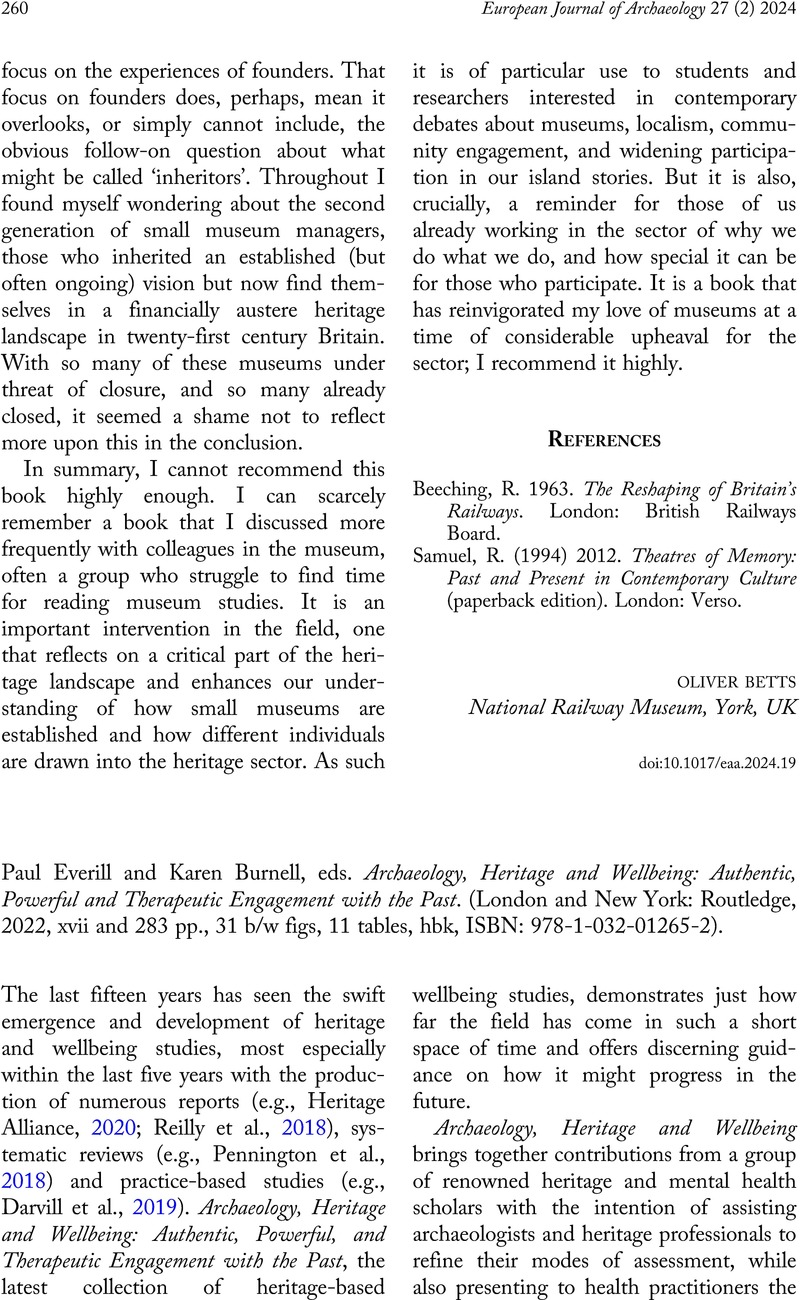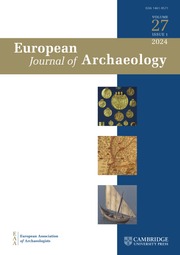No CrossRef data available.
Article contents
Paul Everill and Karen Burnell, eds. Archaeology, Heritage and Wellbeing: Authentic, Powerful and Therapeutic Engagement with the Past. (London and New York: Routledge, 2022, xvii and 283 pp., 31 b/w figs, 11 tables, hbk, ISBN: 978-1-032-01265-2).
Review products
Paul Everill and Karen Burnell, eds. Archaeology, Heritage and Wellbeing: Authentic, Powerful and Therapeutic Engagement with the Past. (London and New York: Routledge, 2022, xvii and 283 pp., 31 b/w figs, 11 tables, hbk, ISBN: 978-1-032-01265-2).
Published online by Cambridge University Press: 17 May 2024
Abstract
An abstract is not available for this content so a preview has been provided. Please use the Get access link above for information on how to access this content.

- Type
- Book Review
- Information
- Copyright
- Copyright © The Author(s), 2024. Published by Cambridge University Press on behalf of the European Association of Archaeologists
References
Burnell, K., Everill, P., Baxter, L., Makri, E., Watson, K., Monckton, L. & Gradinarova, D. 2021. Guidelines for Involving People with Mental Health Issues in Heritage Projects. MARCH Network Plus Fund Report.Google Scholar
Darvill, T., Barrass, K., Drysdale, L., Heaslip, V. & Staelens, Y. eds. 2019. Historic Landscapes and Mental Wellbeing. Oxford: Archaeopress.Google Scholar
Gallou, E. 2022. Heritage and Pathways to Wellbeing: From Personal to Social Benefits, Between Experience Identity and Capability Shaping, Wellbeing, Space and Society 3. https://doi.org/10.1016/j.wss.2022.100084.CrossRefGoogle Scholar
Heritage Alliance. 2020. Heritage, Health and Wellbeing. A Heritage Alliance Report, London: Heritage Alliance.Google Scholar
Historic England. 2022. A Strategy for Wellbeing and Heritage 2022-2025. Historic England.Google Scholar
Nolan, C. 2020. Therapeutic Landscapes of Prehistory: Exploring the Role of Archaeology in the Promotion of Present-Day Wellbeing. (unpublished PhD dissertation), University of Reading.Google Scholar
Pennington, A., Jones, R., Bagnall, A., South, J., & Corcoran, R. 2018. The Impact of Historic Places and Assets on Community Wellbeing - A Scoping Review. London: What Works Centre for Wellbeing.Google Scholar
Reilly, S., Nolan, C. & Monckton, L. 2018. Wellbeing and the Historic Environment. Historic England Report.Google Scholar
Shaepe, D. M., Angelbeck, B., Snook, D., & Welch, J. R. 2017. Archaeology as Therapy: Connecting Belongings, Knowledge, Time, Place, and Well-Being. Current Anthropology, 58(4): 502–533. https://doi.org/10.1086/692985.CrossRefGoogle Scholar




